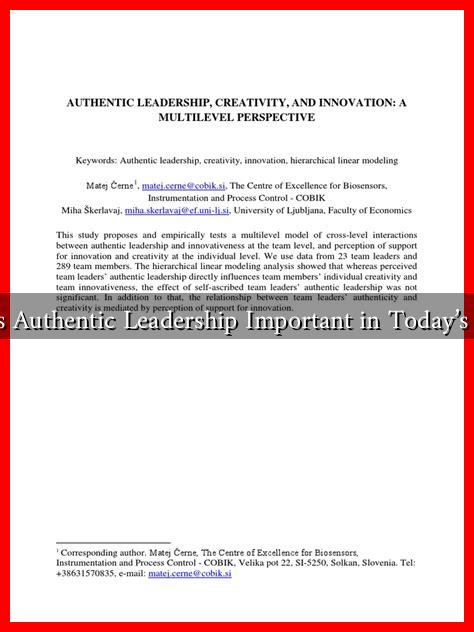-
Table of Contents
Why Is Authentic Leadership Important in Today’s World
In an era marked by rapid change, uncertainty, and a growing demand for transparency, authentic leadership has emerged as a vital component of effective management and organizational success. Authentic leaders are those who are genuine, self-aware, and committed to their values, fostering trust and engagement among their followers. This article explores the significance of authentic leadership in today’s world, highlighting its impact on organizational culture, employee engagement, and overall performance.
The Essence of Authentic Leadership
Authentic leadership is characterized by several key traits:
- Self-awareness: Authentic leaders understand their strengths, weaknesses, and values, allowing them to lead with integrity.
- Transparency: They communicate openly and honestly, fostering a culture of trust.
- Empathy: Authentic leaders are attuned to the emotions and needs of their team members, promoting a supportive environment.
- Consistency: They align their actions with their values, creating a sense of reliability and stability.
These traits not only enhance the leader’s effectiveness but also contribute to a positive organizational culture that encourages collaboration and innovation.
The Impact of Authentic Leadership on Organizational Culture
In today’s complex business landscape, organizations face numerous challenges, including high employee turnover, low morale, and a lack of trust in leadership. Authentic leadership can address these issues by fostering a culture that values openness and inclusivity. Here are some ways authentic leadership influences organizational culture:
- Building Trust: Authentic leaders create an environment where employees feel safe to express their ideas and concerns. According to a study by the Association for Talent Development, organizations with high trust levels experience 50% higher employee engagement.
- Encouraging Innovation: When employees feel valued and heard, they are more likely to contribute innovative ideas. A report from McKinsey & Company found that companies with inclusive cultures are 1.7 times more likely to be innovation leaders in their market.
- Enhancing Employee Well-being: Authentic leaders prioritize the well-being of their team members, leading to lower stress levels and higher job satisfaction. Research from Gallup indicates that engaged employees are 21% more productive than their disengaged counterparts.
Case Studies: Authentic Leadership in Action
Several organizations have successfully implemented authentic leadership principles, resulting in significant improvements in performance and employee satisfaction. Here are two notable examples:
- Starbucks: Howard Schultz, the former CEO, emphasized the importance of creating a culture of belonging and transparency. His authentic leadership style helped Starbucks navigate challenges, such as the COVID-19 pandemic, by prioritizing employee health and safety while maintaining open communication with customers.
- Microsoft: Under Satya Nadella’s leadership, Microsoft transformed its culture from one of competition to collaboration. By promoting empathy and inclusivity, Nadella has driven innovation and growth, resulting in a 150% increase in Microsoft’s stock price since he took over in 2014.
The Future of Leadership: Embracing Authenticity
As the world continues to evolve, the demand for authentic leadership will only grow. Organizations that prioritize authenticity will be better equipped to navigate challenges and seize opportunities. Here are some trends that highlight the importance of authentic leadership in the future:
- Remote Work: With the rise of remote work, leaders must foster trust and connection in virtual environments. Authentic leadership can bridge the gap by promoting open communication and collaboration.
- Diversity and Inclusion: As organizations strive for greater diversity, authentic leaders will play a crucial role in creating inclusive cultures that value diverse perspectives.
- Corporate Social Responsibility: Consumers increasingly expect companies to act ethically and responsibly. Authentic leaders who prioritize social impact will resonate with customers and employees alike.
Conclusion
In conclusion, authentic leadership is essential in today’s world as it fosters trust, encourages innovation, and enhances employee well-being. By embracing authenticity, leaders can create a positive organizational culture that drives performance and engagement. As we move forward, organizations that prioritize authentic leadership will not only thrive but also contribute to a more ethical and inclusive business landscape. The future of leadership lies in authenticity, and it is time for leaders to embrace this transformative approach.

